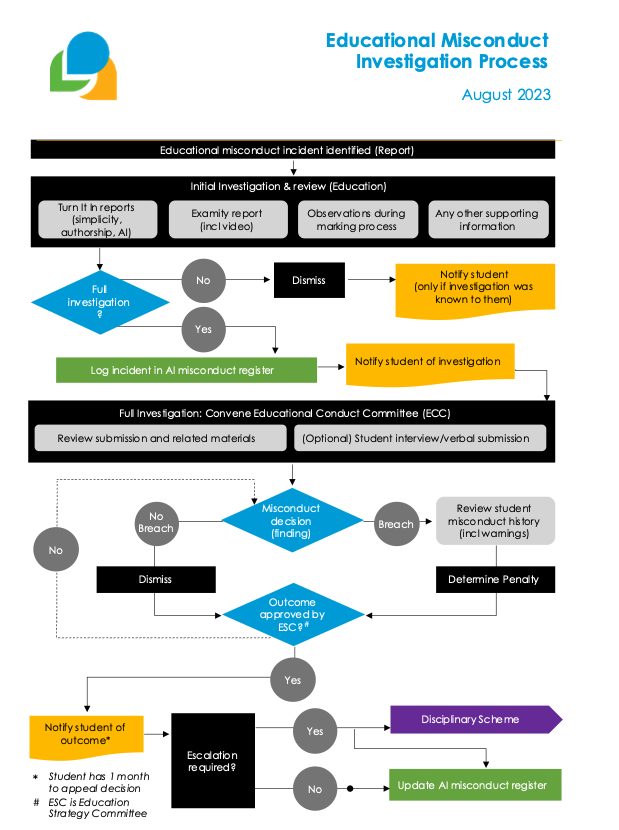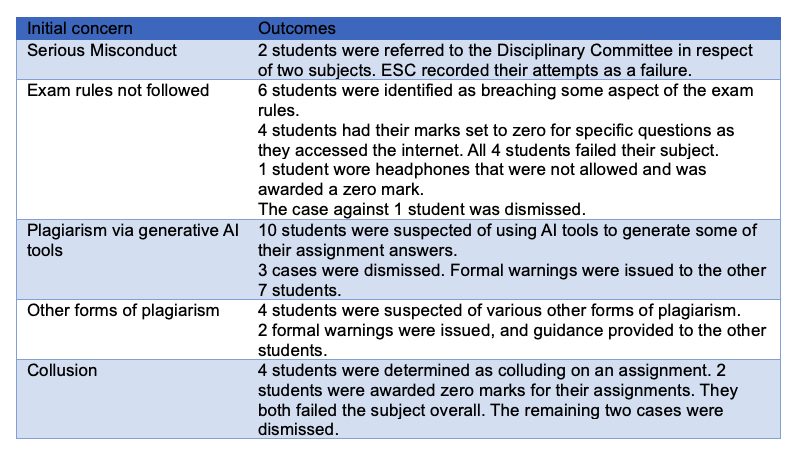
Education Misconduct: An Insight into the Institute’s Approach
Providing quality education and fair assessments has always been imperative to the Actuaries Institute.
This brief article outlines our processes and responses to education misconduct allegations that occurred in Semester 1, 2023.
Chief examiners concentrate their efforts on both the provision of education and setting assessments that enable students to demonstrate the competencies desired by the Practice Committees. A working assumption is that few, if any, students will breach exam rules because they would risk failing an exam or potentially face much more serious issues. Students recognise the challenging work required to pass actuarial subjects and require the system to be robust to ensure a level playing field.
There are numerous news stories discussing misconduct by university and school students, so it is natural to ask if the Institute has experienced similar behaviour. In Semester 1, 2023, we observed some minor misconduct cases and two cases were sufficiently serious to warrant referral to the Disciplinary Committee.
While we cannot discuss the more serious cases, we hope that by sharing our processes and other findings, members will be assured by the back-office effort to protect the integrity of the Education Program.
Governance
All students are members and hence are obliged to follow the Code of Conduct. When a student enrols in a subject, they are provided access to the Educational Conduct Policy. This policy clarifies what constitutes educational misconduct as well as providing a framework for reporting, investigating, and determining the penalties for instances of educational misconduct.
Educational misconduct includes any form of unacceptable or improper conduct which:
- affects the educational validity of an Institute assessment process or that of the assessment itself;
- involves a lack of honesty connected to an Institute assessment process; and/or
- fails to comply with a direction, instruction, procedure, rule, or policy issued by the Institute in relation to an assessment, regardless of the medium in which the conduct occurs.
Examples include, but are not limited to:
- failing to comply with exam rules;
- contract cheating;
- collusion;
- collaboration;
- fabricating information;
- plagiarism; and
- recycling or resubmitting work.
All exam attempts are monitored by an online proctoring service, Examity. In addition, there are a variety of tools that we use to identify assignment misconduct issues such as plagiarism or collusion. These range from using artificial intelligence algorithms to manual checks.
The process to determine the extent of any penalty is shown in the following flowchart.

Semester 1, 2023 Investigations Process
In Semester 1, 2023, we assessed 705 examination scripts and 910 assignments.
In addition to the two serious misconduct cases, there were 24 instances of potential misconduct, as detailed in Table 1. Each student involved in potential misconduct was interviewed by three Institute staff. Nine of these cases were penalised and failed their subject as a result.
Table 1: Summary of misconduct cases

Learning
Four students who breached exam rules used the internet to search the definitions of words. All but one of the words were defined in the subject materials that are available to view during the examination. The other was a technical term that was not defined in the subject material but was deducible from the context of the question. Not being allowed to use the Internet was a new exam rule, and we expect future students will be more alert.
The interviews with students who used ChatGPT to prepare their assignments has helped chief examiners improve how to set assignments, to ensure that artificial intelligence tools alone cannot generate a response that would pass.
The remaining students who were suspected of plagiarism committed errors that are easily corrected, such as being clear with quotations or references. The offences did not warrant deducting marks. Chief examiners have developed material to reduce these minor infractions.
The collusion issue occurred as one student shared their assignment answers with another student prior to submission. Both were deemed in breach of the Educational Conduct Policy and the penalty was to record zero marks for their assignment, which led to both failing the subject. All students are reminded that their submitted work must be all their own work during semester and declare this on the cover sheet of their submission.
Closing remarks
The Institute takes educational misconduct very seriously, as highlighted in this article. We were pleased that most students completed Semester 2 without raising any concerns about their professionalism.
The Education Team, including operations, Chief Examiners, markers, and independent examiners, will continue to be vigilant so that all members can be confident in the integrity of the Education Program.
CPD: Actuaries Institute Members can claim two CPD points for every hour of reading articles on Actuaries Digital.






